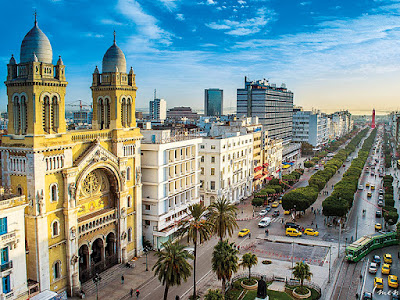Tunisia
 Tunisia
Tunisia

According to Greek legend, Dido, a princess of Tyre, was the first outsider to settle among the native tribes of what is now Tunisia when she founded the city of Carthage in the 9th century bce. Although the story is certainly apocryphal, Carthage nonetheless grew into one of the great cities and preeminent powers of antiquity, and its colonies and entrepôts were scattered throughout the western Mediterranean region.

Map Tunisia


Tunis limits


Other cities include Sfax (Ṣafāqis), Sousse (Sūsah), and Gabès (Qābis) on the fertile coast and Kairouan (Al-Qayrawān) and El-Kef (Al-Kāf) in the arid interior.


We shared the ground floor of a shapeless old building, a sort of two-room apartment. The kitchen, half of it roofed over and the rest an open courtyard, was a long vertical passage toward the light. But before reaching this square of pure blue sky, it received, from a multitude of windows, all the smoke, the smells, and the gossip of our neighbours. At night, each locked himself in his room, but in the morning, life was always communal.


Tunisia, country of North Africa. Tunisia’s accessible Mediterranean Sea coastline and strategic location have attracted conquerors and visitors throughout the ages, and its ready access to the Sahara has brought its people into contact with the inhabitants of the African interior.

According to Greek legend, Dido, a princess of Tyre, was the first outsider to settle among the native tribes of what is now Tunisia when she founded the city of Carthage in the 9th century bce. Although the story is certainly apocryphal, Carthage nonetheless grew into one of the great cities and preeminent powers of antiquity, and its colonies and entrepôts were scattered throughout the western Mediterranean region.

Tunis
Carthage fought a series of wars with its rival, Rome. Rome prevailed in the mid-2nd century bce, razed Carthage, and ruled the region for the following 500 years. In the 7th century Arab conquerors converted the native Berber (Amazigh) population of North Africa to Islam. The area was ruled by a succession of Islamic dynasties and empires until coming under French colonial rule in the late 19th century.

After achieving independence in 1956, Tunisia pursued a progressive social agenda and sought to modernize its economy under two long-serving presidents, Habib Bourguiba and Zine al-Abidine Ben Ali. However, Tunisia remained an authoritarian state with an all-powerful ruling party and no significant institutions of representative government. (For a discussion of political changes in Tunisia in 2011, see Jasmine Revolution.)

Tunis limits

Tunisia
Tunisia’s culture is highly diverse, in part because of long periods of Ottoman and then French rule but also because populations of Jews and Christians have lived among a Muslim majority for centuries. Similarly, the capital, Tunis, blends ancient Arab souks and mosques and modern-style office buildings into one of the most handsome and lively cities in the region.

Other cities include Sfax (Ṣafāqis), Sousse (Sūsah), and Gabès (Qābis) on the fertile coast and Kairouan (Al-Qayrawān) and El-Kef (Al-Kāf) in the arid interior.

Tunisia’s people are renowned for their conviviality and easygoing approach to daily life, qualities that Albert Memmicaptured in his 1955 autobiographical novel Pillar of Salt:

We shared the ground floor of a shapeless old building, a sort of two-room apartment. The kitchen, half of it roofed over and the rest an open courtyard, was a long vertical passage toward the light. But before reaching this square of pure blue sky, it received, from a multitude of windows, all the smoke, the smells, and the gossip of our neighbours. At night, each locked himself in his room, but in the morning, life was always communal.

This warmth, joined with the country’s renowned hospitality and cuisine, has contributed greatly to Tunisia’s growing popularity as a destination for tourists from throughout Europe and the Americas.











0 Comments